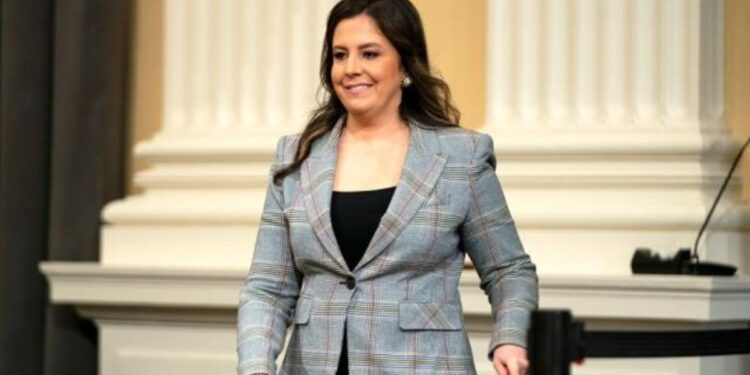Rep. Elise Stefanik (R-N.Y.) lodged an ethics complaint on Tuesday against special counsel Jack Smith. In the complaint, Stefanik accuses Smith, who is overseeing the federal investigations into former President Trump, of attempting to unlawfully interfere with the 2024 presidential election.
Stefanik, the House GOP conference chair and a trusted ally of Trump, lodged a complaint with the Justice Department’s Office of Professional Responsibility. She alleges that Smith is attempting to expedite Trump’s federal election subversion case.
Stefanik issued a statement, stating that it is evident to any rational observer that Jack Smith is attempting to interfere with the 2024 election and prevent the American people from electing Donald Trump. She further emphasized that Smith has consistently tried to expedite the illegal prosecution of President Trump, with the hidden agenda of bringing him to trial before the November election.
According to her argument, Smith should face censure for disregarding the guidelines set forth in the Justice Department’s manual. She specifically points to a section that states attorneys must not manipulate the timing of any action with the intention of influencing an election.
According to Stefanik, Smith’s behavior has tarnished the reputation of the Department of Justice and the entire federal government. She believes that the Office of Professional Responsibility should take appropriate disciplinary action to address this misconduct.
According to The New York Republican, Smith’s actions in court are cited as evidence of political bias. This includes requesting the Supreme Court to consider Trump’s immunity claims before they had been reviewed by an appeals court.
The Justice Department is unlikely to take any action in response to the complaint. This is because Smith’s case began with an indictment in August 2023, which is 15 months before the presidential election.
Smith’s office has chosen not to provide a comment in response to Stefanik’s letter.
The Justice Department has an unofficial practice known as the “60-day rule,” which advises prosecutors to refrain from taking any actions that could potentially impact an election within the 60-day period leading up to it.
The prosecutor on Smith’s team, who is handling Trump’s documents case in Florida, recently emphasized their interpretation of the “60-day rule.” According to them, this rule applies to investigative actions or the filing of a case that could potentially impact an election, rather than the continuation of efforts in an ongoing case.
During the case, Jay Bratt, the prosecutor, informed the judge that Smith’s team had sought guidance from the department’s Public Integrity Section regarding the specific section of the manual mentioned by Stefanik.
Bratt assured the court that the provision in question does not pertain to cases that have already been charged and are currently being litigated. He emphasized that it also does not apply to setting a trial date. Bratt confidently stated that their organization is fully compliant with these regulations.
Trump, of course, is the first presidential candidate to push the boundaries of this rule by contending with an ongoing prosecution while running for office once again.
Stefanik’s complaint mirrors the concerns raised by Trump’s legal team in court. They argue that they are struggling to keep up with the overwhelming amount of evidence they must review in the case.
In addition, she meticulously dissects Smith’s submissions to the Supreme Court. At a certain juncture, Smith advocated for the court to bypass the appeals court and address Trump’s claim of immunity from prosecution as a former president. This unconventional maneuver, if it had been successful, would have expedited the resolution of the matter.
Stefanik questioned the public’s compelling interest in the prompt resolution of this case, apart from the upcoming election.
In addition, Smith faced criticism for submitting a filing in the case even though District Judge Tanya Chutkan had temporarily suspended proceedings. Although Chutkan’s order did not explicitly forbid new filings, Trump’s complaints prompted her to direct Smith’s team to obtain prior permission before submitting any further documents.
Stefanik’s ethics complaint on Tuesday once again showcased her unwavering loyalty to former President Trump, further solidifying her position as a potential running mate for him.
In November, Stefanik took action by filing an ethics complaint against Judge Arthur Engoron, the presiding judge in the former president’s civil fraud trial. She accused him of displaying “inappropriate bias and judicial intemperance” and called for his resignation.
In December, Stefanik requested an ethics investigation into U.S. District Judge Beryl Howell. Judge Howell had presided over cases related to Trump and the January 6th rioters.
Stefanik remains open to the possibility of serving as Trump’s running mate. In a January interview with NBC News, she expressed her willingness to serve in any capacity in a Trump administration, stating “I, of course, would be honored to serve in any capacity in a Trump administration” when asked about the vice president position.










